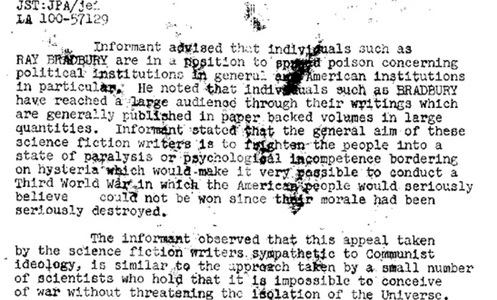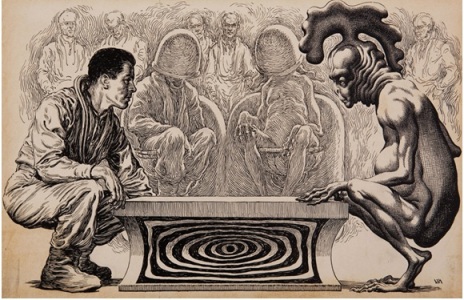
Fragment from the cover of the book Fahrenheit 451 by Ray Bradbury. Source: Flickr
Around the 1950s, the US government kept a close watch on citizens suspected of having links with the communist regime, and encouraged their fellow citizens to denounce them. Science fiction writer Ray Bradbury was one of the victims of the collective hysteria, accused of practices that put North American society at risk by potentially frightening people “into a state of paralysis or psychological incompetence”. What practices were they referring to? His job. Writing science fiction books.
We are dealing with one of those cases in which fiction ends up feeding back into the reality that gave rise to it, creating situations worthy of the best speculative literature.
In the 1950s, the US government was swept up in anti-communist paranoia, urging and encouraging part of society to report anything that they suspected of even the slightest connection to communism. It was the start of blacklists, resentment amongst neighbours, confrontations, and shadowy informers who ferreted out potential prey and, like dogs loyal to their owners, pointed out the way to them. Any name was liable to be whispered into the ears of the FBI.
And one day, that name was Ray Bradbury, science fiction writer. Several well-known anti-communists had reported that the author of The Martian Chronicles regularly engaged in “anti-American activities”, and was thus a threat to society as a whole. The accusations make interesting reading: they suggest that Bradbury was planning to travel to Cuba to strengthen ties with anti-imperialist activists, for example, and accuse him of having called some of his colleagues at meeting of the Screen Writers guild “cowards and McCarthyites”, an attitude reminiscent of certain pro-communist members of the Writers Guild of America. But the most interesting accusation was the one below:

An anonymous informer warned the FBI that writers such as Bradbury were a potential threat to American institutions because of the popularity of their works. The informer declared that the general aim of these science fiction writers is to “frighten people into a state of paralysis or psychological incompetence bordering on hysteria which would make it possible to conduct a Third World War which the American people would believe could not be won since their morale had been seriously destroyed.” The informer concludes that those books are fertile ground for the growth of communism and sow the seeds of distrust of American institutions. It took the FBI until 1968 to decide that Ray Bradbury was not a threat, and that he could continue to be considered a “known liberal writer”.
Basically, the FBI was scared of people reading. Nothing new. The possibility of critical, educated, informed citizens is a fear that has disturbed those in power since way back in history. The burning of books and libraries has been standard modus operandi for totalitarian regimes that seek to implement their ideas, crushing any other point of view. There is the classic example of the burning of books by Jewish authors in Nazi Germany – another case in which propaganda was a key element –, the burning of all books with political content deemed inappropriate as part of the confiscation and burning of books after the 1973 Military Coup in Chile, and more recent examples such as the burning of many thousands of books, statues, and artistic objects from other cultures by the Islamic State.
Compared with these atrocities, the dystopias depicted in many science fiction works no longer seem like fantasy, but like accurate predictions of the present. In Fahrenheit 451, Bradbury imagined an artificially happy society in which books were burned in order to wipe away any traces of angst. Then there is George Orwell’s 1984, with its Big Brother controlling everything, a notion that we are getting used to with disturbing ease. Orwell’s shadow has spread into series such as Black Mirror, which shows dumbfounded viewers the dark side of the technology that has made its way into every nook and cranny of our lives. And its influence can be seen in the work of authors such as Alan Moore, whose V for Vendetta presents a totalitarian state with a regime that uses mass media propaganda as well as police methods to control the population. It is the cutting edge, they say.
The Wachowski brothers produced the film adaptation of Moore’s graphic novel seven years after the release of Matrix, their science fiction film depicting a future in which we are the unknowing slaves of an artificial intelligence that controls us and uses us for its own ends through the illusion of the Matrix. So far and yet so close. Technology is now present in all areas of our public and private lives. It is practically impossible to escape constant monitoring of our every move, through surveillance cameras, credit cards, or that object of desire that has made its way into our pockets like a tiny Trojan horse: the smartphone.
Thanks to this hyper-connectivity that we willingly submit to, we navigate through innumerable social networks, mostly unaware of their terms and conditions. Information travels through systems, which thousands of eyes fixed on data that is constantly at risk of being caught up in the next leak. Even adulterers have something else to lose sleep over, on top of their subterfuge and the feelings that go with it. Every publication, note, comment, and message that we write is stored on some server, and now the alchemical powers of Big Data transform information that initially seemed to be a useless mountain of lead is into pure gold. With each passing day that we spend clicking on buttons or screens, we are recorded, catalogued, studied and known. Our privacy is stored away in the next-smallest Matryoshka doll, our secrets shrinking every step of the way. Perhaps our thoughts will become the only space inaccessible to such high levels of control?

I’m not so sure about that. Aside from the non-stop bombardment of advertising and publicity that buffets us like endless waves shaping our tastes and interests (look over the aims of neuromarketing and laugh), technology can also open a way into our most intimate space: our minds. All the big tech corporations like Facebook, Google, and Microsoft are optimistically waiting for virtual reality to arrive in our everyday lives, and we ourselves are just as eager to have those new toys at home. But we shouldn’t forget that while virtual reality can help us to overcome fears, reduce prejudice, and learn empathy, it can also be used to manipulate society for the opposite ends. We are starting to understand how to delete or change our memories in order to adjust their emotional toll, which, by definition, changes who we are. There are even techniques like transcranial stimulation that are proving useful in reducing symptoms of depression. Perhaps in the future there will be some kind of sleep-learning technique like the one described by Aldous Huxley in Brave New World. If so, you’ll find me in a forest living with the exiled book-lovers that Bradbury imagined. Always Bradbury.



Leave a comment